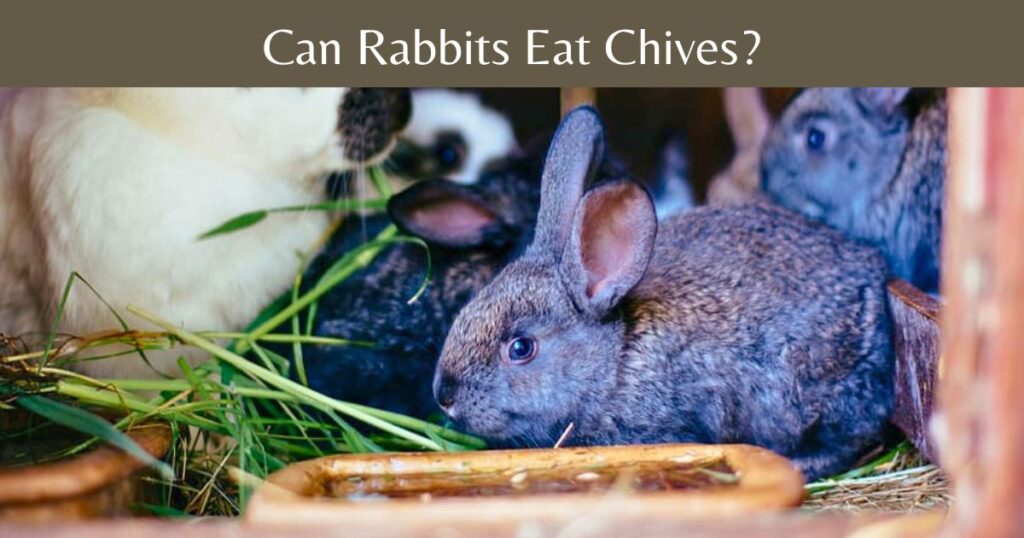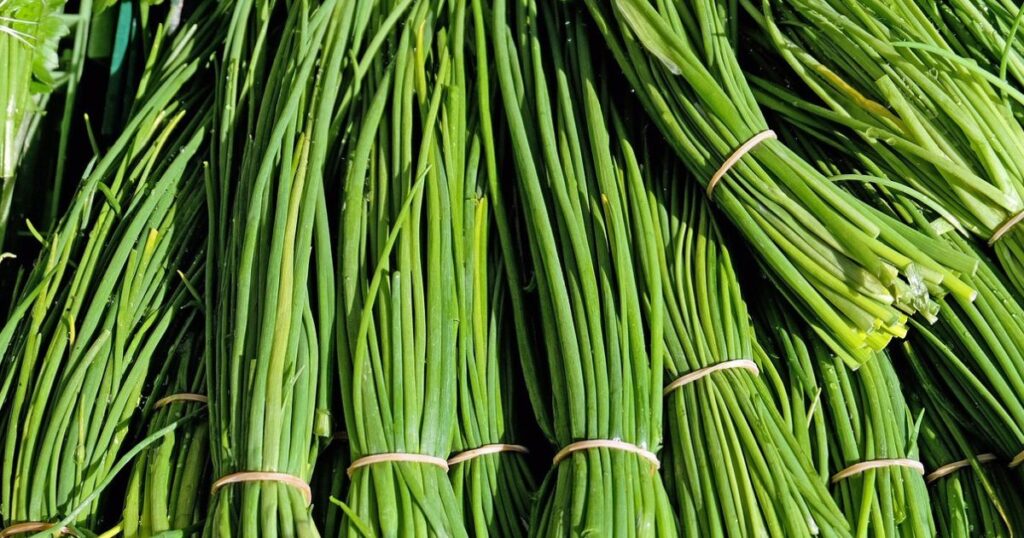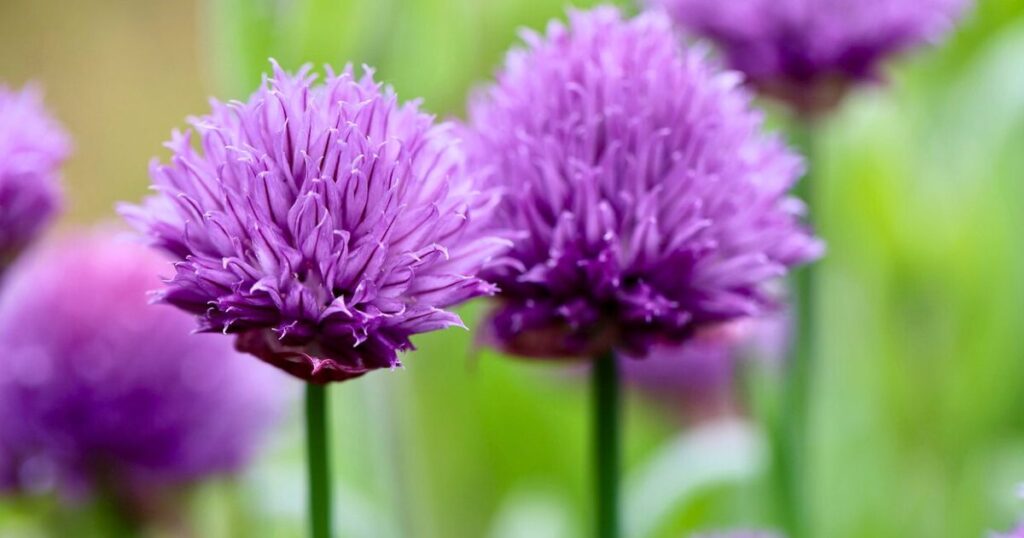
Chives (Allium schoenoprasum) are a type of herb belonging to the Allium family, including onions, garlic, and leeks.
Chives are characterized by their thin, long, green leaves with a mild onion-like flavor and are often used as a garnish or flavoring in various culinary dishes.
But can rabbits eat them, too?
It’s generally not recommended for rabbits. Chives contain compounds, such as thiosulfates, that can be harmful to rabbits and other animals. Even though some sources might suggest that small amounts of chives could be safe for rabbits, it’s best to avoid offering chives to rabbits.
But what if they accidentally ate some of it?
Let’s find out!
Table of Contents
Can Rabbits Eat Chives?
No, rabbits should not be fed chives.
Chives belong to the Allium family, which also includes onions, garlic, and leeks.
Allium plants contain compounds that can be harmful to rabbits and other animals. These compounds, such as thiosulfates, can cause digestive upset, gastrointestinal irritation, and even more severe health issues, including hemolytic anemia, which is the destruction of red blood cells.
Feeding chives to rabbits can lead to symptoms like vomiting, diarrhea, abdominal pain, lethargy, and, in severe cases, it can even be fatal.
It’s important to avoid giving your rabbits any foods from the Allium family, including chives, to ensure their safety and well-being.
Is Chives Safe for Rabbits?
No, chives are not safe for rabbits.
Chives belong to the Allium family, which also includes onions, garlic, and leeks.

These plants contain compounds that can be harmful to rabbits.
While some sources might suggest that small amounts of chives could be safe for rabbits, the potential risks and lack of consensus within the veterinary community make it advisable to err on the side of caution and avoid feeding chives to rabbits.
Even if chives are given in small quantities, there is still a risk of digestive upset, gastrointestinal irritation, and potentially more severe health issues.
Some rabbits might be more sensitive to these compounds than others.
It’s best to avoid chives altogether and focus on offering foods that are known to be safe and appropriate for their diet.
Also Read: Can Rabbits Eat Ginger?
Here is Why Rabbits Shouldn’t Eat Chives
Rabbits should not eat chives due to several important reasons:
Toxic Compounds
Chives, like other members of the Allium family (which includes onions, garlic, and leeks), contain compounds like thiosulfates that can be toxic to rabbits.
These compounds can cause a range of health issues, including gastrointestinal irritation, digestive upset, and more severe problems like hemolytic anemia, which is the destruction of red blood cells.
Gastrointestinal Upset
Chives can lead to digestive disturbances in rabbits.
Their delicate digestive systems are adapted to a specific diet, and introducing foods that are not part of their natural diet can lead to stomach upset, diarrhea, and discomfort.
Other Complications
Consumption of chives by rabbits can result in symptoms such as vomiting, diarrhea, abdominal pain, lethargy, and even more severe reactions.
In some cases, the toxic compounds can cause oxidative damage to cells and disrupt the proper functioning of a rabbit’s system.
For the well-being of your rabbits, it’s important to avoid offering them any foods from the Allium family, including chives.
What to Do If Your Rabbits Accidently Ate Chives?
If you suspect that your rabbits have accidentally eaten chives, it’s important to take swift action to minimize any potential harm.
Chives belong to the Allium family and contain compounds that can be toxic to rabbits.
Here’s what you should do if you believe your rabbits have ingested chives:
- Firstly, keep a close eye on your rabbits for any signs of distress or illness. These could include vomiting, diarrhea, abdominal pain, lethargy, rapid breathing, and drooling.
- Offer some clean water at all times.
- Hydration is important to help flush toxins out of their system.
- If you notice any unusual behavior or symptoms, it’s crucial to contact a veterinarian who is experienced in rabbit care immediately.
- Provide them with information about the situation, including how many chives your rabbits might have ingested and any observed symptoms.
Can Rabbits Eat Chive Flowers?
Chive flowers, just like chives themselves, belong to the Allium family, which also includes onions, garlic, and other plants that contain compounds that can be harmful to rabbits.

While chive flowers may be milder in flavor compared to the actual chive bulbs, they still carry the risk of containing substances that can be harmful to rabbits’ health.
So, it’s generally recommended to avoid feeding chive flowers to rabbits.
Even in smaller quantities, these plants can cause digestive upset, gastrointestinal irritation, and more severe health issues.
Symptoms can include vomiting, diarrhea, abdominal pain, lethargy, and, in serious cases, hemolytic anemia, which is the destruction of red blood cells.
Can Rabbits Eat Chive Stems?
Chive stems, like the rest of the chive plant, belong to the Allium family, which includes onions, garlic, and other plants that contain compounds that can be harmful to rabbits.
While the stems might be less concentrated in these compounds compared to the bulbs, there’s still a risk associated with feeding chive stems to rabbits.
Due to the potential health risks, it’s generally best to avoid giving rabbits chive stems.
These plants can cause digestive upset, gastrointestinal irritation, and more serious health problems.
So, if you want to treat your rabbits, opt for safe and healthy options like fresh vegetables, fruits, and a limited amount of pellets.
Do Rabbits Eat Chives In The Garden?
Rabbits are known to be curious nibblers and might eat a variety of plants they encounter in gardens, including chives.
However, this does not mean that chives are safe or suitable for them to consume.
Chives belong to the Allium family, which contains compounds that can be harmful to rabbits and other animals.
If rabbits eat chives from your garden, it could lead to digestive upset, gastrointestinal irritation, and potentially more serious health issues.
The severity of the reaction can vary from rabbit to rabbit, but it’s best to prevent them from accessing chives altogether.
What Herbs Can Rabbits Eat?
Rabbits can enjoy a variety of herbs that are safe and nutritious for them.
These herbs can be a great addition to their diet and provide both flavor and potential health benefits.
Here are some safe herbs that rabbits can eat:
- Parsley: Fresh parsley is a popular herb choice for rabbits. It’s rich in vitamins and minerals, including vitamin C.
- Basil: Basil is another herb that rabbits tend to enjoy. It’s low in calories and provides a pleasant aroma and taste.
- Mint: Mint leaves are safe for rabbits and can offer a refreshing flavor. However, it’s best to offer mint in moderation as it can be quite potent.
- Cilantro (Coriander): Cilantro leaves are safe and can be a flavorful addition to your rabbits’ diet.
- Dill: Dill leaves are safe for rabbits and can add variety to their meals.
- Oregano: Fresh oregano leaves can be given to rabbits in small amounts. It’s a good source of antioxidants.
- Thyme: Fresh thyme can be offered to rabbits occasionally. It has aromatic oils that can provide flavor.
- Rosemary: Small amounts of fresh rosemary can be given to rabbits, but it should be used sparingly due to its strong flavor.
Remember, while these herbs are safe, it’s important to offer them in moderation. Too much of any new food can lead to digestive upset.
Rotate the herbs you offer to provide variety in taste and nutrients.
Final Thoughts
To wrap this up, it’s best to avoid feeding chives to rabbits.
Chives, along with other plants from the Allium family, like onions and garlic, contain compounds that can be harmful to rabbits.
Even though there might be differing opinions on the potential safety of small amounts of chives, the consensus among veterinary experts is to err on the side of caution.
The compounds present in chives can lead to digestive upset, gastrointestinal irritation, and potentially more serious health issues in rabbits.
So, it’s best to avoid chives altogether.
Before you leave, here are more helpful articles:
